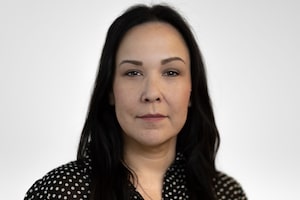Thunder Bay Police Service on patrol on March 10.David Jackson/The Globe and Mail
Donald Mamakwa’s mother has questioned for years whether her son would still be alive had he been taken to hospital instead of jail. That’s what Ina Kakekayash told jurors on the first day of a coroner’s inquest examining the deaths of two Indigenous men – Mr. Mamakwa and his uncle Roland McKay – who died while in the custody of the much maligned Thunder Bay Police Service.
Ms. Kakekayash told the five-person jury that her 44-year-old son told police he wasn’t feeling well and that he should’ve been taken to the hospital instead of the jail cell where he died hours after he was arrested for apparent public intoxication.
“Knowing he died in jail is the most painful part,” Ms. Kakekayash said in emotional testimony through an Anishinaabe translator who sat beside her and her daughter, Rachel Mamakwa.
Mr. Mamakwa died on Aug. 3, 2014, after he was found unresponsive, slumped against the wall in the Thunder Bay police station cell. Mr. McKay also died in police custody in a separate incident on July 20, 2017. He was also found unresponsive in a cell after he was arrested for apparent public intoxication.
A coroner’s inquest is mandatory when someone dies in police custody. This inquest will examine how the men were assessed for suspected intoxication, policies and procedures for police interaction with intoxicated people, whether it’s appropriate to put intoxicated people into police custody, and how racism, biases and stereotypes may have played a part in how the men were treated by first responders, specifically the police.
The Thunder Bay Police Service has been under intense scrutiny the last few years over allegations of abuse, shoddy investigations and systemic racism that have forced the police board to disband and triggered a search for a new chief.
The lawyers for the families in these cases argue that both men were in medical distress and mistreated by police while in custody.
An earlier Special Investigations Unit investigation into Mr. Mamakwa’s death cleared the officers involved of any wrongdoing, but said police failed to take the man to the hospital after he complained of difficulty breathing. They also failed to tell paramedics of Mr. Mamakwa’s breathing difficulties.
It’s an example of the missed opportunities that could have saved the lives of both men, Peter Keen, counsel for the coroner, told the jury in opening statements. He is expected to call on medical and racism experts to testify.
Independent panel says Thunder Bay police force needs new leadership and fundamental reforms now
The jury will also see video footage from the police station of how another Indigenous man, Dino Kwandibens, was dragged into the booking area and mistreated by officers hours before Mr. Mamakwa was brought in. It’s evidence that the Thunder Bay Police Service fought to have excluded because they argued it was irrelevant and outside the scope of the inquest. Presiding coroner David Cameron ruled last spring that it should be allowed.
Ms. Mamakwa testified she found out about her brother’s passing through news reports of a 44-year-old male dead in custody. She and her sister drove around looking for him before going to the police station to confirm their fears. Ms. Mamakwa had just seen her brother days before when she gave him a new pair of shoes.
Ms. Kakekayash also recalled seeing her son two days prior to his death, when she gave him new socks and $10 outside Thunder Bay’s city hall bus terminal. She noticed he didn’t look well but he never wanted to worry her, she said.
The jury heard how Mr. Mamakwa, the only son and middle child of five siblings, moved to Thunder Bay from his home in Kasabonika Lake First Nation, a fly-in community north of the city. He ended up using alcohol to cope with trauma and grief from family breakdowns and deaths, eventually leading to his homelessness.
“I remember him going to treatment and he completed it,” Ms. Mamakwa said.
Mr. Mamakwa had entered the then-newly developed alcohol management program Kwae Kii Win, which means to turn your path or life around in Anishinaabemowin.
Ms. Kakekayash also testified how Mr. Mamakwa was a diabetic who managed his condition well when he wasn’t using alcohol.
While the jury has the task of examining the cause and manner of both deaths, one of the listed causes for Mr. Mamakwa is diabetes ketoacidosis, which is a serious complication from diabetes. The jury can also make recommendations aimed at preventing similar deaths.
Mr. McKay, like his nephew Mr. Mamakwa, came south to Thunder Bay from a fly-in community. He had medical appointments scheduled in the city that he wasn’t able to get at home in Kitchenuhmaykoosib Inninuwug.
Mr. McKay’s elderly mother Sarah Jane McKay and his niece Denise Tait testified how the 50-year-old high school graduate was a community helper who did odd jobs, while also helping to care for his mother. One of eight siblings in a tight-knit family, Mr. McKay wasn’t known by his family to get involved with police.
Ms. Tait said her uncle enjoyed getting together with friends when he was in the city, and although at times he struggled with alcohol, he always made his way home.
Like their relatives in the Mamakwa family, the McKay family wants to make sure that everyone is treated with respect and dignity by first responders, especially if they are alone, helpless and under the influence.
Ms. McKay wants to know why her son died.
“Why did he leave me? Now I don’t have anyone looking after me,” she said, clearly distraught.
The inquest is scheduled for 17 days and expected to hear from 31 witnesses.
 Willow Fiddler
Willow Fiddler